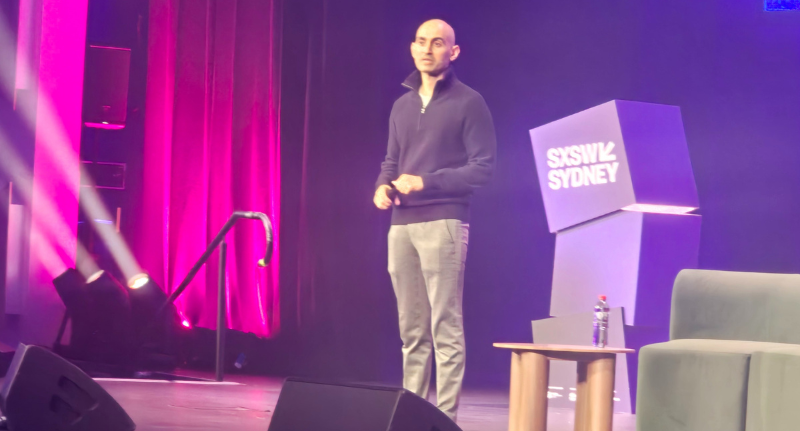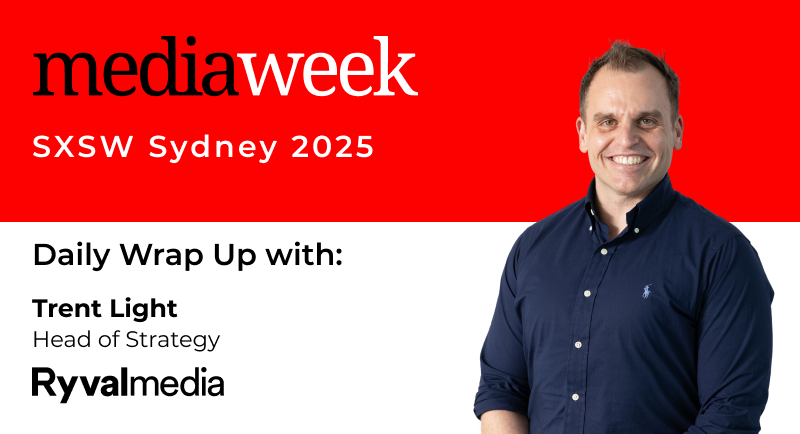I didn’t think things could get busier than day one, but day two certainly delivered.
Lots of new arrivals and jam-packed sessions covering everything from AI (again!) to workplace culture and mindfulness. While conceptually, those topics may seem worlds apart, all of the sessions seemed to complement each other as the theme of a massive shift in “the work, the workforce and the workbench” started to become clearer.
I was one of the many who started the day with a great session organised by Accenture talking about the future of the customer – and the 8am start time was definitely worth it. The panel discussed five trends that will shape the way we work, shop and interact with each other as a society moving forward.

The Accenture panel.
They spoke about the death of “hustle culture” and the opportunity to finally work smarter, not harder. While the term isn’t new and has become almost a cliche, the panel discussed how AI is making it a reality and giving us more time to be “who we are, rather than what we do”.
The power of connection
Future customers will be seeking out real connections with brands, and more human experiences and emotions such as in-store shopping and more ‘IRL connections’ with people as a counterbalance to the curated worlds served up on digital platforms.
Whether that is enhancing the in-store experience, creating a community, or tapping into cultural connections, it became clear that brands will need to develop closer and real relationships with their customers than ever before if they want to thrive in the new economy.
Unfortunately, I didn’t follow my own advice from yesterday about arriving early at the sessions you know will be popular and was blown away by the queue to hear from VP of Business at Prosperity, Ryan Foutty.
Hosted by Forbes’ editor in chief, Sarah O’Caroll, Ryan spoke about the shift that is happening in real time in digital marketing, where “click bait “ is becoming less incentivised and authentic, credible content is being rewarded as people shift to platforms that deliver answers rather than information.
Prosperity was founded on the belief that it serves the world’s curiosity, and Ryan believes that those who know the right questions to ask will thrive in the new economy, while those who just want information or use AI as a shortcut will be left behind.
He also spoke very passionately about Prosperity’s vision to work with the most trusted brands and publishers to ensure the answers the platform serves are trustworthy, relevant and objective information.
How do you build a great place to work?
The session was a great lead into the next session facilitated by Rebecca Moulynox from Great Places to Work. We heard from people and culture leaders from Adobe, CarSales and DHL about how they foster a culture of curiosity and innovation in their businesses.
The key to unlocking that culture is creating a psychological safe space for ALL staff to question, test, fail, learn and succeed to deliver better solutions for their customer, but also their employees.
Neil Patel’s myths
The final session of the day kicked off with a bold statement from NP Digital Founder, Neil Patel – Unlearn everything from 2025. He had eight key ‘unlearnings’ for marketers who attended.

To summarise, the staples of digital marketing most rely on have changed.
In fact, they are now MYTHS. The things we need to unlearn, according to Neil, are:
– Traffic equals revenue. Don’t look for instant gratification from vanity metrics like clicks and site visitation. Real growth takes time and consistency.
– Rankings equal revenue. Relevance and authority is what matters in the new AI world.
– Broader beats specific. Optimising your search strategy towards queries rather than broader keywords is key to winning new customers.
– One global creative asset. Local nuance and cultural relevance is critical to connecting your brand with customers in global markets..
– Proof over polish. People are no longer looking for fancy, polished creative – they want real, authentic content that demonstrates why consumers should choose your brand over another.
– Every touchpoint must convert. Connecting with your consumers through multiple touchpoints at the right moments has a cumulative effect on driving the outcome you want.
– All AI platforms are the same. Neil spoke about AI platforms becoming more like social platforms, where consumers use different platforms for different purposes. Some are built for deeper insights, while others are built for every day queries.
– Stop trying to ‘rent’ audiences. Developing communities and creating genuine connections with consumers through real human experiences will help grow your brand.
A long day with lots of sessions and deep conversations, but it was interesting to put the pieces of the puzzle together.
AI is going to impact the way we work and live, however, it will never replace genuine human connection, both in the workplace and outside of work.
Looking forward to seeing everyone tomorrow at Clear Hayes House for our session – Where Did All the Real Intelligence Go?
Has the race for automation and efficiency in the AI era led to businesses leaving ‘real intelligence’ behind? Has this emphasis on efficiency led to a “brain drain,” where the technology is reducing our critical thinking instead of accelerating it?
The truth is, today’s most ambitious brands want collaborators who are hungry, human, and committed to driving real success.
This session will challenge that status quo and explore how shifting from a ‘satisfactory’ to ‘successful’ mindset can empower people, unlock deeper partnerships, and prove that a hungry, human mind is the most powerful tool in any marketer’s arsenal.


